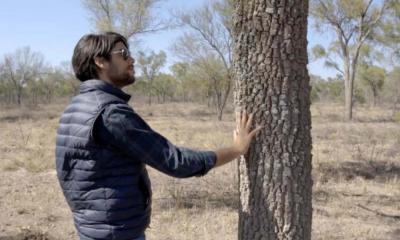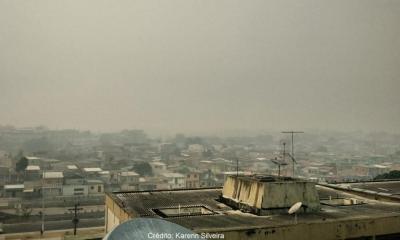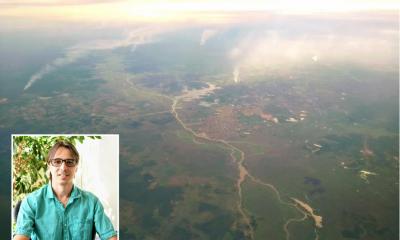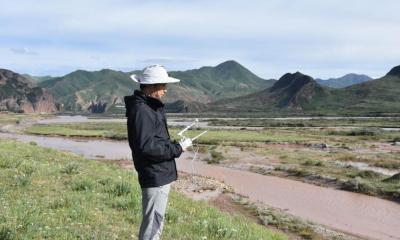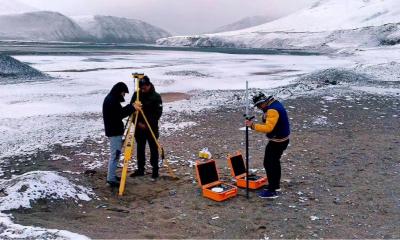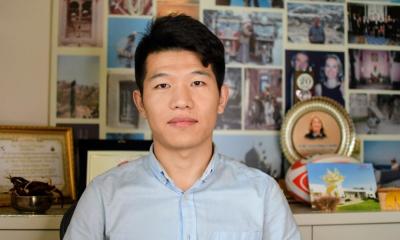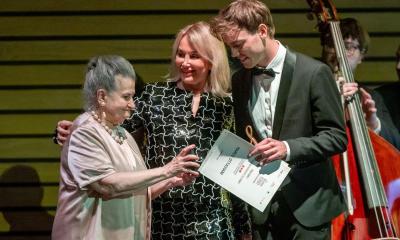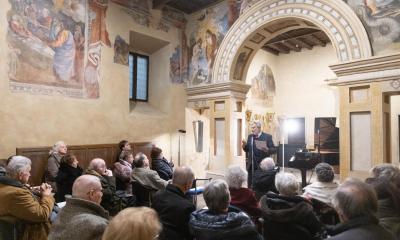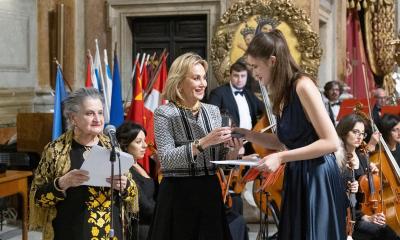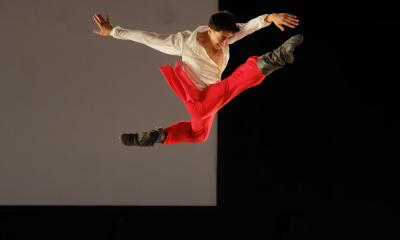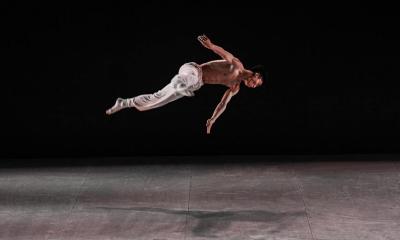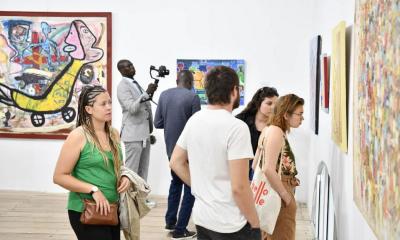PROJETS - INTERNARIONAL
Rapport d'activités 2022
Le sommaire
-
ITALY
OPERATION SERVANT | UNIQUE MEDICAL PUBLICATION
FACIAL RECONSTRUCTIVE SURGERY DR DANIEL CATALDO
SENEGAL CHU FANN
THE CUOMO CARDIO-PAEDIATRIC CENTRE
STATISTICS
Total Financial Support since 2013 : € 6793490

The Cuomo Cardio-Paediatric Centre is unique as the only reference centre of its kind in all West Africa.
The greatest testament to the effectiveness of this structure was the celebration of the one thousandth patient operated on in October 2022. This framework now allows certain partners, whose mission is to care for sick children, to develop a new concept, that of the South-South axis, which allows children from neighbouring countries to be treated without having to be transported to Europe, which is the most humane way of providing humanitarian care.
Overview of surgical operations performed since 2017
STATISTICS
Amount awarded in 2022 : € 100 000
It carries out three missions related to public service, which are governed by the code of the Legion of Honour.
Napoleon Bonaparte created the Legion of Honour distinction not merely to recognise acts of military valour, but also to thank French or foreign individuals who, in some way, contributed to France’s excellence.
The archives of this decoration represent an invaluable heritage, which is why the project to preserve them, called “Memory of Honour”, will allow history, names, and reasons for which certain individuals were awarded this distinction to be perpetuated for centuries to come.
History cannot be constructed without memory and education cannot be constructed without history.
Therefore, it became evident that to aid education, history needed to be preserved through this elegant and ambitious Memory of Honour project.
A little-known function of the Grand Chancellery of the Legion of Honour is the education of young females in boarding schools, this mission was established in 1805.This programme continues today welcoming over 1,000 students, many of whom are either orphans or come from disadvantaged backgrounds, into the schools of the Legion of Honour in Saint-Denis.
The modernity of this concept, which promoted the education of young girls over 200 yrs. ago, is striking and unfortunately remains a hot topic in many parts of the world today.
Therefore, the Foundation has chosen to invest in this outstanding project in the foreseeable future as part of its ongoing support for female educational empowerment.
INDE TAMIL NADU
SUPPORT TO SCHOOLS
PERSONAL POINT OF VIEW BY CHARLES KULANDAI - PROJECT MANAGER- INDIA
Imparting knowledge about climate change is inevitable in today’s world. This phenomenon helps to understand and tackle the consequences of global warming, encourages people to change their behaviour and helps them to adapt to what is already a global emergency.
STATISTICS
Amount Granted in 2022 : € 384507
Total Amount Granted since 2002 : € 8876254
People in India believed that the effects of climate change only applied to other countries and not to us. However, recent storms, floods and changing of seasons in Tamil Nadu has urged and forced everyone to rethink their values and priorities. Education to the future generation will motivate and empower them to learn and tackle the challenges of tomorrow.
Cuomo Foundation has been relentlessly working to instil the importance of Climate Change in the hearts and minds of children.
Scholarships are offered by the Cuomo Foundation in Monaco in collaboration with the Prince Albert II of Monaco Foundation (FPA2) and the Intergovernmental Panel on Climate Change (IPCC) for students pursuing PhDs in climate change-related fields.
With all of this in mind, in 2019 the Cuomo Foundation built a green school in Mambakkam to help the students better comprehend climate change and the value of living in harmony with environment.
Chennai is typically described as being hot, dry, and dusty. That is how most people view Chennai. But in November 2022, over 500 city streets were under water for three days. Several suburbs experienced weeks-long flooding. Climate experts deemed the rainstorm that hit the city hard over the weekend of November 6–8 extraordinary in a year of La Nina, when rainfall is generally poor.
People have taken time to understand the seasonal impact on the climate change, but we cannot postpone the urgency of this topic. It is the need of the hour, and the problem is imminent. Government joining hands with NGO’s and other social institutions try to inculcate in the minds of future generation. There needs to be awareness programmes, adding this topic in all the school syllabus, special focus and provide scholarship programme for the students who do research on climate change. It’s either now or never. Soon the word “SEASONS” may not be available to us.”
Charles Kulandai
Chennai, Tamil Nadu - May 2022
Indian Schools Activity Report for 2022
By Charles Kulandai
After the long hiatus due to Covid 19, all the Schools in Tamil Nadu reopened in early June.
To encourage and motivate the students in the school, Cuomo Foundation sponsored smart classrooms in each school supported by Cuomo Foundation.
Smart classes help in developing interest among students and avoid boredom. The use of smart technology in the class attracts students’ attention by displaying animated media, such as videos, pictures, and audio which creates better learning outcomes.
St. Joseph’s Higher Secondary School, Kovalam
1200 students were enrolled for the new school year.
During the academic calendar these events were highlights
- 21st June - World Yoga Day
- 11th August - Drug Awareness Oath
- 15th August - Independence Day
- 5th September - Teacher’s Day
- 15th September - Zonal Sports Meet
New Developments and Programmes
-
Spoken English classes organized for 6th std till 9th std after the school hours in the evening
-
Elena Cuomo Computer classes were restarted to inculcate computer literacy for the 6th to 9th students
-
Silambam (Tamil Nadu, Martial Arts) & Kungfu classes were introduced
-
Proper counselling for slow learners and Career guidance classes were organized for 10th and 12th students
-
Orientation classes for teacher’s organized to improve their knowledge in teaching English
Alfredo Cuomo Higher Secondary School, Sendivakkam
Alfredo Cuomo Higher Secondary School, Sendivakkam held an orientation day on the 13th August with a Career Guidance Programme for students and teachers.
Dr C Francis MSW, MBA,M.sc
(Counselling Psychology), Ph.D, Head of the department of social work, NGO Consultant and Trainer in Human Rights was the resource person appointed in charge of this initiative.
The main topics covered under this programme were:
- Student involvement in education after Covid-19
- How to overcome addiction to mobiles
- Drugs awareness camp
- Some of the younger Residential student boarders at Sendivakkam were introduced to a programme called GO GREEN for planting new trees inside the campus and the school hopes to start a GO GREEN Nursery Farm.
YOUNG STUDENTS AT ALFREDO CUOMO HIGHER SEC SCHOOL TAKE PART IN THE GO GREEN INITIATIVE
Amala Annai Higher Secondary School, Mambakkam
The diocesan administration transferred Fr. Velankanni to St. Paul’s Mat. Hr. Sec. School and appointed Fr. C. Isaac Jaganathan to be the new correspondent of Amala Annai Hr. Sec. School.
The academic year commenced on the 13th of June ,2022.
Currently there are 616 students in the higher secondary school and there are 309 children in the primary school.
Various new Programmes were organized by the school management
- “Failing to plan is planning to fail” to refresh the mindset of the education staff, after a long summer hiatus, an orientation programme for the teachers was held by Mr Kennedy and Mr Willet
- Mrs Sarah Lieberson (advisor to Cuomo Foundation) and Mr Charles Kulandai (Project Manager- India) participated in the anniversary of remembrance for Mr Alfredo Cuomo, organized at Amala Annai Sec.School on the 18th of July. Trees were planted and an opening ceremony was held to unveil a new playground for the primary schoolchildren
- Teacher’s day celebration
- Sports meet
- Awareness programme for boys and girls
St. Charles Higher Secondary School, K.G.Kandigai
The New Academic year began on the 13th of June and Rev Fr Austin Jose welcomed the teachers and the students.
Highlights of the academic calendar
- Most Rev Dr George Anthonysamy made a visit to the school campus on 3rd July and had a positive interaction with the teachers and the students
- Zonal sports meet was held from 20th August to 2nd September at Dr Radhakrishnan Boys – Higher Secondary School in Tiruttani. The St Charles students participated and won many categories
- Teachers’ day celebration held on 5th September
- Students performed various cultural events to facilitate the teachers on this day

HISTORIQUE DU NOMBRE D’ÉLÈVES SCOLARISÉS PAR ÉCOLES 2009 - 2022
Alfredo Cuomo Scholarships and Elena Cuomo Scholarships
In 2022, a total of 45 male and female students completed their college studies supported by the Alfredo Cuomo Scholarship programme. All 45 students were pupils at the Cuomo Foundation schools; 25 from Kovalam and 10 each from Sendivakkam and K.G.Kandigai.
Since its inception in 2004 over 586 students have benefitted from this programme for support for education for the disadvantaged.
In addition, 3 Female students Ms L.Deepa (B.E) , Ms G.P Amala (B.E) and Ms Desiya Geetha (Pharmacy) successfully obtained their respective college graduation degrees through being supported by the Elena Cuomo Scholarship programme for the last 3 years.
The Cuomo Foundation is evaluating its Indian scholarship programme in general and plans to bring certain amendments as part of the evolution of the programme. A modified version will come into effect from the new academic year of June 2023.
EXTRACURRICULAR ACTIONS AND ACTIVITIES – TAKEN IN 2022 AND PLANNED FOR 2023
- Public announcements made to attract more students to enrol in the schools for new academic years.
- Coaching classes have been set up for school students from 6th to 10th standard. This should improve their knowledge to successfully pass the public exams and others such as NEET and the 12th-grade exam.
- Intensive coaching will be provided after school hours to improve results in government exams for 10th, 11th, and 12th-grade students.
- Special orientation courses continue to be organized for teachers to improve their skills and provide quality education to students.
- Planning of various revenue generating programmes to support schools in coordination with respective dioceses.
- The Alfredo Cuomo Scholarship programme is being redefined for students conducting research on relevant/common-interest topics.
Charles Kulandai
Mai 2022, Chenna
INDIVIDUAL SCHOLARSHIP GRANTS/SUPPORT
ROSHAN SUSAIRAJ
Roshan is completing his Bachelor of Science in Computer Science at Patrician College of Arts and Science in Chennai. In 2022, he began his third and last year of study. In 2023, he hopes to undertake a prolonged stay in London to enrol in an “intensive” English Language training course.
JENIFER SUSAIRAJ
Roshan’s older sister Jenifer received her master’s in commerce in 2021. She is currently employed by the HDFC Bank in Chennai and is additionally studying remotely to get her MBA with a Human Resources specialisation.
STATISTICS
Amount awarded in 2022 : € 25000
Total budget allocated : € 50000
Since 2013, the Foundation has partnered with the IPCC Scholarship programme to support PhD students from developing countries in their scientific research to understand the risks of climate change and its impact on their local environments and communities.
The Foundation is continuing its commitment by enabling and funding further applied research by a number of those former recipients of the IPCC scholarship programme in their current investigations. Argentine researcher Dr Pedro Fernandez was a beneficiary of the 2019-21 IPCC scholarship awards funded by the Foundation.
In 2022, the Cuomo Foundation agreed to support Dr Fernandez in his new research project to be undertaken at the Humboldt University of Berlin. A funding agreement was signed on March 5th,2022 with the Humboldt University and with the researcher’s home institute, the National Institute of Agricultural Technology in Argentina.
Excerpt of the 2022 progress report on Dr Fernandez project, by his supervisor Professor Tobias Kuemmerle of the Humboldt University of Berlin:
“During the last four months, the project “Sustainable cattle ranching in South America’s tropical dry forests” progressed as planned by Dr Fernandez.
On the one hand, Dr Fernandez leads a systematic review of the cattle ranching in the South American dry diagonal, and a manuscript reviewing knowledge gaps and opportunities to rot them has been started to be written.
On the other hand, mapping efforts to characterize livestock intensification have begun, and training data have been prepared. We started to identify machine learning and deep learning methods to map feedlots and silage bags for the whole Chaco region, and the models will be calibrated by Fernandez and another PhD student together with the lab team.
Finally, new networks were built to address the problem in collaborative research together with Alto University (Finland), Catholic University of Leuven (Belgium) and Madison State University (USA). Researchers from these institutions will help carry out the research questions, especially in the Cerrado and Caatinga biomes. In this sense, also local organizations were contacted, particularly in Bolivia and Paraguay, and will help to the process with field training and validation, data.
In the next three months, Dr Fernandez will complete the mapping efforts for the Dry Chaco and Chiquitania and submit to a peer-reviewed journal the review manuscript. In addition, two research manuscripts will be advanced with key research questions of the problem addressed.”
POSTDOCTORAL RESEARCH
2022 RETROSPECTIVE
Cuomo Foundation supports new research programme on deforestation impact on Gran Chaco in South America
2022 Jun 02
STATISTICS
Amount awarded in 2022 : € 25000
Ana and her dancing and production partner Guillermo Anastasi travelled throughout Argentina and Brazil in 2022, showcasing Tango through performances and courses involving over 450 participants from Argentina, Bolivia, Chile, Columbia, Peru, and Venezuela. According to Ana Amarillo’s observations, some experts in the tango industry wish to keep this dance ‘behind closed doors’, in private schools and clubs, while initiatives like this project help return tango back to its roots as a popular dance accessible to all.
“The Argentinian and Uruguayan tradition of the Tango, now familiar around the world, was developed by the urban lower classes in Buenos Aires and Montevideo in the Rio de la Plata basin. Among this mix of European immigrants to the region, descendants of African slaves and the natives of the region known as criollos, a wide range of customs, beliefs and rituals were merged and transformed into a distinctive cultural identity. It is practised in the traditional dance halls of Buenos Aires and Montevideo, spreading the spirit of its community across the globe even as it adapts to new environments and changing times. Tango is also incorporated into celebrations of national heritage in Argentina and Uruguay, reflecting the widespread embrace of this popular urban music.”
- UNESCO Video and Sound Collections
In 2009 UNESCO granted official status to The Tango as “Intangible Heritage of Humanity”.
STATISTICS
Amount awarded in 2022: € 8500
Total budget allocated: €18667
The Cuomo Foundation signed a Letter of Agreement with The Prince Albert II of Monaco Foundation (FPA2) in 2013 to provide financial support for the IPCC Scholarship Programme. Initially, the Cuomo Foundation agreed to fund 6 of the beneficiaries for the 2013-15 second round of awards. Mr Bheki Maliba from South Africa was one of those Cuomo-funded students. In late 2016, he successfully completed his doctorate.
The Cuomo Foundation agreed to continue to support and pay Mr Maliba’s MBA studies in 2022. He intends to acquire a farm and use fresh technologies for environmentally friendly agricultural practices in South Africa after finishing a master’s in business management.
STATISTICS
MONTANT ATTRIBUÉ EN 2022 : € 12500
COÛT TOTAL : € 37500
Brazilian forestry engineer, Dr Igor Olivieira Ribeiro new applied research, entitled “Alerting people to the risks of fire smoke – EducAIR “ commenced in late 2021 and continued throughout 2022.Involving numerous public schools and over 1,000 schoolchildren in Manaus, capital of Amazonas, the NW state in Brazil that is almost entirely covered by the Amazon Rain Forest; the initiative aims to teach and instruct how to monitor air quality degradation caused by Amazon forest fires.
Excerpt from the progress report of Dr Ribeiro
“Since we started the project, we did not imagine that we would have such great resistance from public high schools with the implementation of a University project. The main reasons for this resistance are:
1. the schools are full-time, with no free rooms for us to carry out our workshops;
2. Teachers don’t want a commitment to help us with the operational control and maintenance of air quality sensors in schools;
3. some schools are not fully secure and sensors can be stolen (the school manager does not want to take that risk);
4. School managers can only take action to suspend classes due to air pollution through a formal and official order from the State Department of Health, or the State Department of Education and, mainly, the Civil Defense of the State of Amazonas.
Thus, the EducAIR Project does not have the authority to do this alone (it is illegal).
So, the two schools where we installed the sensors are for scientific and educational purposes only, where we get local support. Since then, we have sought to carry out educational activities in places and programs that we are invited to, such as the indigenous school, the future scientists programme and the CLIMAS project.
The next step was to forge a partnership with the Civil Defense of the State of Amazonas so that this information could be used as a reference for any action to suspend activities and classes in communities and schools in the region during the critical period of the forest fires. With this formal partnership with the Civil Defense, we will reach all public schools and students in the State of Amazonas, that is, around 1.2 million basic education students (data from the Ministry of Education, 2021).
We are currently building an official technical cooperation term between the University and the Civil Defense, to formalize this partnership, with a duration of 24 months. This partnership with the Civil Defense of the state is essential for achieving our goals. This whole process has been a great learning experience for us. At the same time, we will continue working so that the “EducAir” Project is a legacy and continues as a public tool for education and monitoring of air quality over the next few years.”
POSTDOCTORAL RESEARCHES
2022 RETROSPECTIVE
"An informed citizenry builds a better world" - Brazilian scientist's work praised by local press
2022 Jul 11
Amazonas communities help monitor real-time air quality
2022 Feb 25
STATISTICS
Amount awarded in 2022: € 5000 euros
Amount awarded to the Zeine Association since 2014: € 63340
In 2022, the 7th edition of the annual event took place from 16th to 19th March at the Royal court of Tiébélé; the home of the Kassena people of southern Burkino Faso.
Ever since the 16th century, the Kassena have been decorating the exterior walls of their houses with elaborately painted murals. The painting is done exclusively by the women who pass on the skill to their daughters. Through this event, the elder women pass on their ancestral knowledge and technique to young girls while also helping them prepare for their future social and domestic responsibilities. The primary goal of this Dizénidani Association project is to maintain a long-standing custom that has been passed down through the generations.
Efforts are being made to register the Royal Court of Tiébélé, and its remarkable architecture, as a designated UNESCO World Heritage Site. Therefore, the continued commitment of all local and international partners is crucial for the project to succeed.
STATISTICS
Amount awarded in 2022: € 15000
Total budget allocated : € 30000
"Rapid atmospheric warming since the mid-twentieth century has increased temperature-dependent erosion and sediment-transport processes in cold environments, affecting food, energy and water security. In this Review, we summarize landscape changes in cold environments and provide a global inventory of increases in erosion and sediment yield driven by cryosphere degradation. Anthropogenic climate change, deglaciation, and thermokarst disturbances are causing increased sediment mobilization and transport processes in glacierized and periglacierized basins. With continuous cryosphere degradation, sediment transport will continue to increase until reaching a maximum (peak sediment). Thereafter, transport is likely to shift from a temperature-dependent regime toward a rainfall-dependent regime roughly between 2100–2200. The timing of the regime shift would be regulated by changes in meltwater, erosive rainfall and landscape erodibility, and complicated by geomorphic feedbacks and connectivity. Further progress in integrating multisource sediment observations, developing physics-based sediment-transport models, and enhancing interdisciplinary and international scientific collaboration is needed to predict sediment dynamics in a warming world.”
[Source: www.nature.com]
An agreement was signed on March 21, 2022 between the National University of Singapore, Dr Dongfeng Li and the Cuomo Foundation.
POSTDOCTORAL RESEARCHES
2022 RETROSPECTIVE
Foundation supports new research in the ‘Third Pole’ by Chinese IPCC Scholarship awardee
2022 Jun 27
Foundation funded IPCC doctoral scholar Dr Dongfeng Li’s research cited in latest IPCC report
2022 Mar 04
A Cuomo Foundation-funded IPCC Scholarship researcher has been recognised in the prestigious international journal SCIENCE
2021 Nov 02
STATISTIQUES
Amount awarded since 2017: € 186409
The discussions revolved around the establishment of a facility equipped for renewable energy research, training, and development. Its primary goal being to boost the use of renewable energy sources in the region, particularly those with higher potential such as solar, biomass, wind, and hydraulic.
After several years of negotiations with the Cuban local authorities, an agreement was reached in 2018, and the first order for technical equipment was finalised and funded by the Cuomo Foundation in 2019.
In 2022, the University proposed a new initiative that would allow Cuomo Foundation recommended students interested in renewable energies to participate in a four-week training session at the Renewable Energy Training and Development Centre.
These training programmes would be provided free of charge to “trainees”, who would be responsible for their own transportation and lodging during their visit.
FRANCE DONATIONS
Babel: An Initiatory Journey to Save the World
Opera Nice Côte d'Azur
“Babel: An Initiatory Journey to Save the World” was performed by 140 children on the stages of Nice Opera from June 21 to June 30.
A participatory opera on the challenges of climatic change, it was composed and conducted by Sergio Monterisi and directed by Magali Thomas, who also wrote the libretto.
All the young students were from primary schools in Nice, and they included youngsters with various disabilities.
The production of Babel marks the second time the children have been included in the Nice Opera season, and the Cuomo foundation was pleased to support this exciting project.
STATISTICS
Amount awarded in 2022: € 3110
FRANCE DONATIONS
Artimuse - Science PO
EDHEC Sailing Cup
The Artimuse is the student body yachting club of Sciences Po, the renowned French university.
The Artimuse is a non-profit organisation that teaches students about sailing through its mythological ‘Sailing Days’. Furthermore, crucially its purpose is to educate students by organising conferences on the marine environment concerns including ocean protection.
Artimuse adds to Sciences Po’s prominence by competing in the EDHEC Sailing Cup, Europe’s premier student sporting event and the world’s largest intercollegiate offshore regatta. This race would not be possible without the assistance of significant corporate relationships.
STATISTICS
Amount awarded in 2022: € 5300
STATISTICS
Amount awarded in 2022: €60000
Budget allocated since 2004: € 931200
The Cuomo Foundation has been the principal sponsor of this Roman cultural event since 2004.
Maestro Marcella Crudeli, the competition’s artistic director and founder, led the awards ceremony with a winners’ concert at Roma Tre University’s Palladium Theatre. Denis Linnik, a 27-year-old pianist of Belarusian ancestry, won the 1st Chopin Prize.
Linnik’s charisma and outstanding interpretation of Chopin’s “Concerto No. 2 in F minor, Op. 21,” backed by the talented conductor Pawel Piotr Gorajski and the Roma Tre Orchestra, greatly impressed the international jury, presided over by Marcella Crudeli, as well as the audience.
The 2nd Chopin prize was awarded to 25-year-old Russian pianist Vsevolod Brigida.
Denis Linnik, the competition’s winner, earned a monetary award as well as the opportunity to record and promote an album with the record label KNS Classical. The UNESCO Club of Rome also presented him with a gift. In 2023, he will have the opportunity to perform in ten concerts in Italy and globally.
This result represents the culmination of two weeks of work in selecting the best pianists from 91 young participants from 14 countries across three continents (China, Korea, Germany, Japan, the United Kingdom, Israel, Italy, Norway, Poland, the Czech Republic, Russia, the United States, Switzerland, and Ukraine) who competed in the five sections.
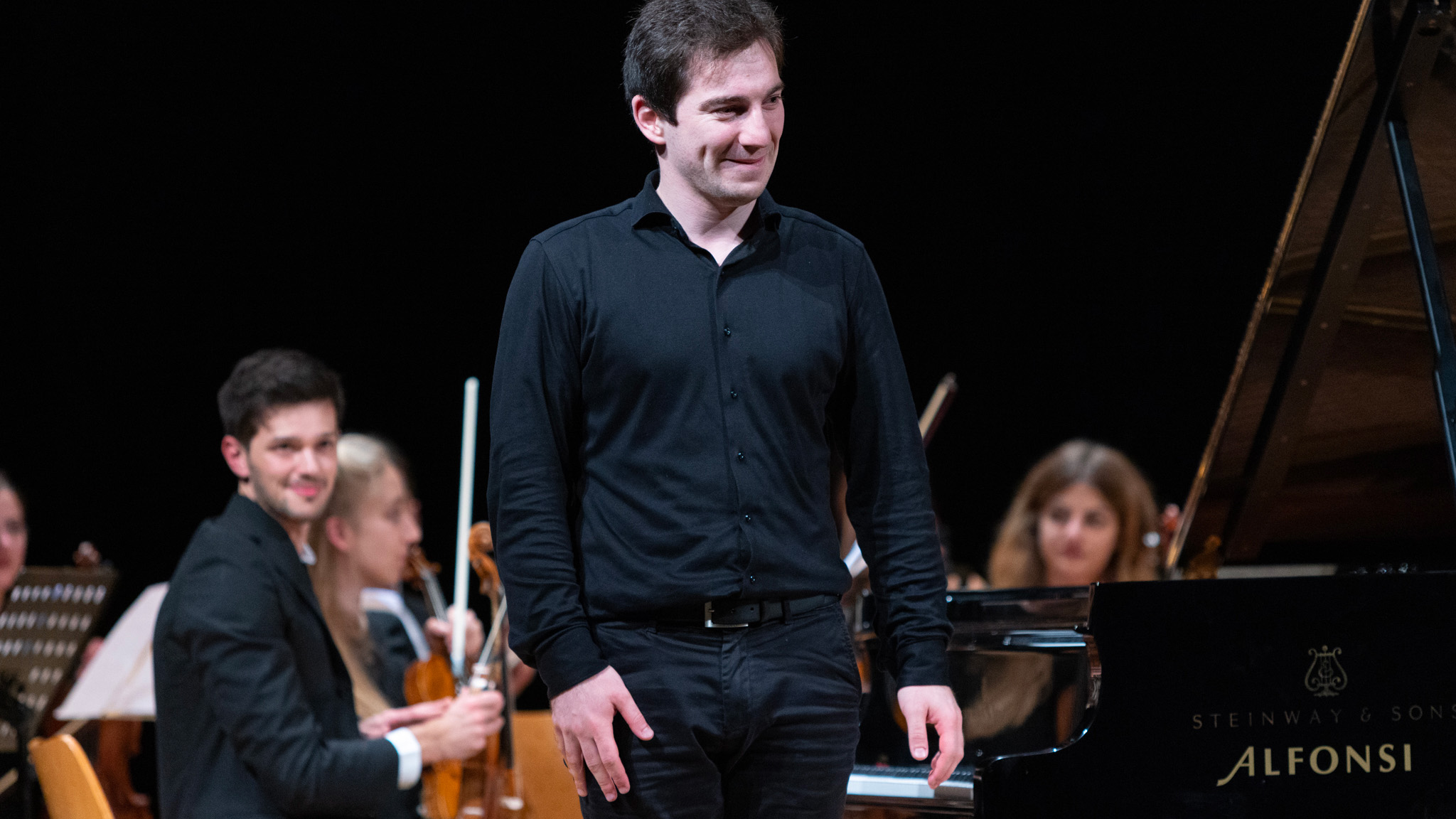
“The Rome Piano Competition last November was a very special event for me. I had the pleasure to perform twice with the Orchestra in the beautiful Palladium Theater, I met many nice people and talented young musicians. And what’s the most important thing for young musicians - as the winner of the Competition, I got a lot of opportunities to play solo recitals in Italy, Belgium, and Poland, which the Rome Competition provides, unlike many other competitions. So, I’d just like to thank the Cuomo Foundation for the support of such nice and helpful competition and of talented young musicians, who are fighting on their way to getting chances to share the beauty of Arts with people.”
Denis Linnik
Winner of the 1st Chopin Prize-International Roma Competition, 2022
‘ROMA’ PIANO COMPETITION
2022 RETROSPECTIVE
34th Rome International Piano Competition – Supported by the Cuomo Foundation
2025 Nov 21
Cultural Event Held at the Chiostro Dei Genovesi
2024 Jan 19
Cuomo Foundation joins the applause and acclaim for the 32nd Roma International Piano Competition
2023 Nov 27
STATISTICS
Amount awarded in 2022 : € 60000
Budget allocated since 2019: €931200
2022 marked the 20th year of the dance competition, which is supported by the municipality of Rome. The event was held from July 8th to July 12th at the majestic National Academy of Dance, which is located on Aventine Hill, one of Rome’s seven hills.
After being presented online via the internet for the previous two years due to the pandemic, the “Premio Roma Danza” made its long-awaited return to the Teatro Grande stage.
Over several days, many dancers of different nationalities participated in the two sections offered: choreography and dance video, with three categories: Dance Movie, Dance Published Production, and Smartphone Dance.
The award presentation and the Gala evening, which featured performances by the young and gifted dancers, were sponsored by the Cuomo Foundation and held on July 12th in the open-air Teatro Grande. 450 people attended.
For the second consecutive year, the international competition involved the municipalities of Rome with the “Roma Capitale” prize. The objective of this prize, which is associated with the “Premio Roma Danza”, is to provide young Romans with the opportunity to tell the story and promote their territory, their neighbourhood, and its peculiarities.
As in previous years, the director Maria Enrica Palmieri carefully selected a renowned international jury. The choreography section was chaired by Shaun Parker, an Australian choreographer, while the dance video section was led by Adriano De Santis, director of the experimental cinematography centre in Rome.
Joining the jury for the choreography section were dance journalist and critic Donatella Bertozzi, visual artist Alfredo Pirri, Tunisian choreographer Nawel Skandrani, and Haitian dancer-choreographer Kettly Noël. Along with jury president Adriano De Santis, jurors for the dance video category were visual arts expert Italo Pesce Delfino and Lebanese filmmaker and videographer Elie Yazbek.
PREMIO ROMA DANZA
2022 RETROSPECTIVE
Premio Roma Danza 2025: Young Dancers Shine in Rome
2025 Sep 29
Alessandro D'Aiutolo: winner of the "Cuomo Foundation Special Prize" at the Premio Roma Danza 2023
2023 Aug 04
Premio Roma Danza 2023
2023 Jul 17
STATISTIQUES
Amount awarded in 2022: € 22550
Dr Cataldo is a founding member of ‘Operation Sorriso-Servant’ also known as ‘Operation Smile’ created by Professor Jean Marie Servant in 1996. Working in collaboration with Saint Louis Hospital and Médecins du Monde and operating principally at National Niamey Hospital in Niger, the team performed life changing facial reconstructive surgery on infants, children and adults afflicted with Noma disease, birth defects, cancer, and severe facial burns.
In the early 1990s, Mr. and Mrs. Alfredo Cuomo were introduced to Dr. Cataldo and Professor Servant. As private donors, they assisted in financing and raising extra funds to support Operation Servant’s early initial actions. The “Special Luigi Frateschi Support” campaign, which was carried out at the National Hospital of Niamey in Niger and gave “a new smile” to 40 young patients, was sponsored by the Cuomo Foundation in 2010.
In 2014, at a prestigious ceremony held at the Aula Magna, Faculty of Medicine, University of Buenos Aries, the Argentine Medical Association awarded Dr Cataldo, the title “Doctor of the Year“. This outstanding academic honour was international recognition of
Dr Cataldo’s ‘commitment to welfare, exemplary vocation, and academic reputation’.
In 2022, to promote Dr Cataldo’s vital work, the Cuomo Foundation agreed to fund the recent global distribution of limited printed special edition copies of Dr Cataldo’s “Facial Reconstructive Surgery” to prestigious medical institutions and universities throughout Africa, Asia, Europe, and Latin America.
“Ten years ago, I started writing this book, the only one in the medical literature worldwide. The aims are to find donors to help cover the cost of this enterprise (printing and distribution), fund further research into the disease and recruit new humanitarian missions around the world.”
Dr Daniel Cataldo
STATISTIQUES
Amount awarded in 2022: € 3716
Total Amount of Funding since 2017: € 8952
Awa underwent a life-changing surgery to correct rheumatic mitral valve regurgitation, which was performed by Prof. Gilles Dreyfus, internationally renowned cardio surgeon and board member of the Cuomo Foundation. As a result of the successful procedure, Awa was able to return to a normal life and complete her secondary education.
Throughout Awa’s school years, the Foundation kept in touch with her and in 2017, they made a commitment to support her undergraduate studies in Applied Biology and Chemical Engineering. Awa successfully completed her degree in 2020, prompting the Foundation to finance her master’s programme at the University of Dakar. In 2021, the Foundation facilitated Awa’s trip to Paris, France, where she underwent further surgery, again performed by Prof. Gilles Dreyfus, to modify her heart and ensure it was compatible with her changing physical condition.
In 2022, Awa successfully applied to the University of Nantes- UFR Sciences and Technology in Western France to study for a bachelor’s degree in Cellular and Molecular Biology. The Foundation continues its funding and support for Awa in her academic ambitions.

SENEGAL ARTS & CULTURE
ITINÉRAIRES ARTISTIQUES DE SAINT-LOUIS
Founded in 2013 by the Senegalese artists association Ndar Creations and under the auspices of the Senegalese Ministry of Culture, this annual Saint-Louis cultural exhibition quickly established itself as a major event on the Senegalese art scene.
STATISTICS
Amount awarded in 2022: €5000
Total amount granted since 2020: € 10000
The Cuomo Foundation has been associated with the event since 2020 and was the principal sponsor of the 8th edition of ‘Les Itineraires Artistique de Saint-Louis 2022’, which was held between 7 May to 10 June,2022.
The title and main theme of this year’s exhibition was «Intergenerational Artistic Encounters and Cultural Diversity”, and it included 65 pieces of multidisciplinary artwork, including paintings, sculptures, photographs, drawings, and digital art, created by 35 artists from Senegal, the Gambia, and Mauritania. With 1,625 visitors and several paintings sold, the exhibition was a great success this year.
In addition to offering experienced African artists the opportunity to exhibit their works, meet art critics, collectors, dealers and gallery owners, parallel workshops for school students were organised; enabling young people to explore artistic practices with skilled artists and to also raise their awareness of environmental challenges.
ITINÉRAIRES ARTISTIQUES DE SAINT-LOUIS
2022 RETROSPECTIVE
Cuomo Foundation principal sponsor of 8th edition of “Les Itinéraires Artistiques de Saint-Louis 2022”
2022 May 31


 Français
Français




